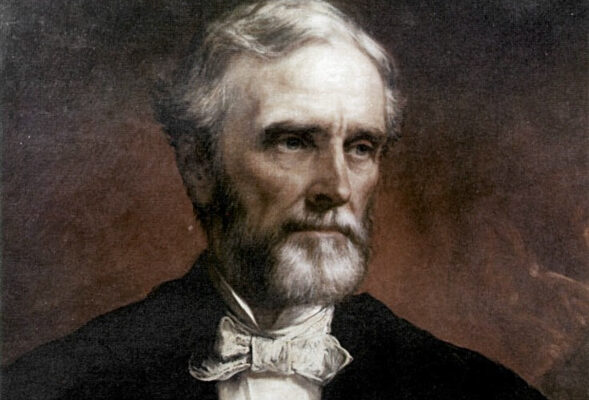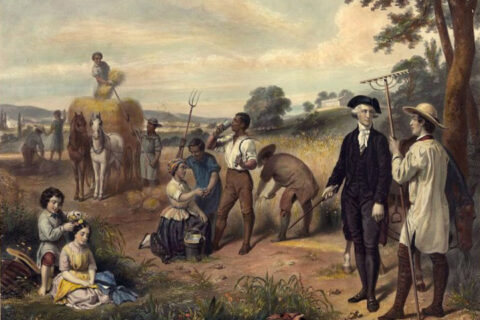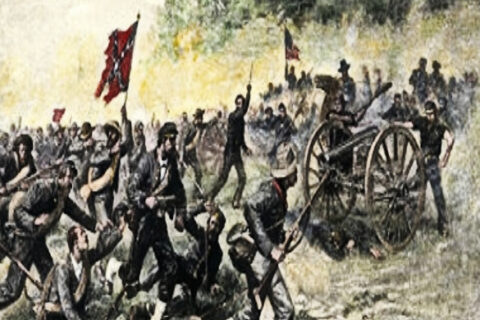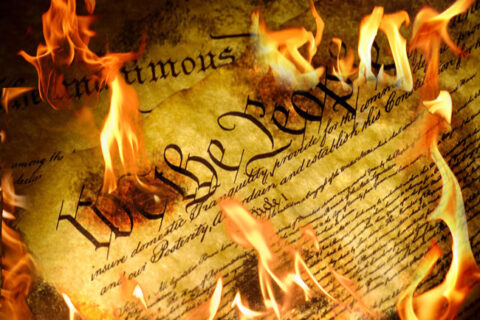I recently finished reading Mike S. King’s Dixieland Deceived: The Grand Conspiracy Behing the U.S. Civil War. While I share in large measure the author’s thesis that “there never has been, and there never will be, a revolution of ‘the people’ that was not conceived, organized, incited and funded by a network of conspirators,” many of his presuppositions and conclusions therefrom cannot be allowed to pass without comment. He assumes motives not in evidence and erects a superstructure which concludes that Abraham Lincoln was a would-be Redeemer President, and that rank-and-file Southerners were duped into believing otherwise.
So, why was I still reading beyond page 21? For one thing, I’ve never really trusted in the pure patriotism of Judah Benjamin. Mr. King, rightly I think, points out that Stonewall Jackson, Beauregard, and Henry Wise hated him and believed he exercised an influence over the decisions and workings of the Confederate government that were out of all proportion to his subordinate offices. After the war was lost, he abandoned Jefferson Davis in Georgia and made a new and successful life for himself as a barrister in Rothschild’s London. On parting, he had given Davis assurances that he’d meet up with him in Texas after wrapping up some loose ends in the Bahamas. Yeah, right. But the author goes beyond the pale in then questioning Davis’s loyalties. He suggests that Davis would have followed Benjamin out of the country had he not been captured!
About the only high official in the Confederacy that is accorded due respect is Alexander Stephens. Even then, he bases that respect solely on what he calls Stephen’s ‘white supremacy honesty’ in the cornerstone speech. Mr. King is a devotee of Peter Marshall in his views of antebellum slavery. He doesn’t mention, if he’s familiar, with the 1833 Johnson v Tompkins opinion of Pennsylvania Supreme Court Judge Henry Baldwin which states that, “the foundations of the [Federal] government are laid, and rest on the rights of property in slaves — the whole structure must fall by disturbing the corner stones — if federal numbers cease to be respected or held sacred in questions of property or government, the rights of the states must disappear, and the government and union dissolve by the prostration of its laws before the usurped authority of individuals.”
He also completely sides with Andrew Jackson’s Force Bill against South Carolina in the nullification crisis. It’s conveniently forgotten by the author, and many others since, that the States ratified the Constitution only for specified purposes, and reserved the right to rescind their accession to the Union at any subsequent time at which they believed the general government was being utilized for their injury or oppression. South Carolina wasn’t really questioning the legality of tariffs, so much as they were reminding the Federal government that they were being exploited by them as though they were colonies, rather than equal partner state in a union from which they could withdraw.
If Andrew Jackson is to be commended for his successful opposition to a Rothschild-controlled Central Bank, he’s to be rebuked for his 1832 Proclamation to the People of South Carolina in which he says that the Constitution forms a government, and not a league, and that to allow for the option of secession is to deny the nation. This kind of Lincoln-Webster inflammatory hyperbole is what really exacerbated ill feelings between the sections, and the Southern states rightly, if they hadn’t already, began to question the future security of self-government in an involuntary union.
The author makes much of the role of the Knights of the Golden Circle, Freemasonry, and the Rothschild banksters in assigning motives and defining events. I don’t doubt there’s much truth in it. Such was the case before, and it has been since. However, it’s beyond a stretch to say that Lincoln’s ‘saving the Union’ set the conspiracy back about 50 years until the passing of the Federal Reserve Act in 1913. Lincoln didn’t want to pay the banksters 24-36% interest for the money he needed to prosecute the war, but under pressure he allowed them to push through the National Banking Act of 1863. Mr. John Sherman of Ohio declared that “there had never been such an opportunity for capitalists to accumulate money.” Historian John Kenneth Galbraith explained: “In numerous years following the war, the Federal government ran a heavy surplus. It could not [however] pay off its debt, retire its securities, because to do so meant there would be no bonds to back the national bank notes. To pay off the debt was to destroy the money supply.”[1]
Mr. King speculates that, had the South won, the banksters in Europe would have accomplished their purposes that much sooner upon a divided union. It seems to me that Lincoln prosecuted an unnecessary war that, on the contrary, played right into their hands then and there. I don’t doubt that there were disloyal conspirators and incompetents in high positions in the Confederate government; or even that Davis may at times have been a poor judge of character or been blinded by his own loyalty to a subordinate. Can you say Braxton Bragg? That said, I think he was an honorable man who loved his people, and I can say the same for many of his other generals and subordinates.
I can’t say the same for Lincoln or any in his administration.
-By German Confederate
[1] Gerard Menuhin, ‘Tell the Truth and Shame the Devil’, pp. 187-188

O I’m a good old rebel, now that’s just what I am. For this “fair land of freedom” I do not care at all. I’m glad I fit against it, I only wish we’d won, And I don’t want no pardon for anything I done.






It seems that pointing out Judah P. Benjamin’s disloyalty might be the only good point in King’s thesis. Whatever government(s) forms up in Dixie and/or America after the American Empire eventually crumbles, let us take note and never again trust the Jew. When someone is not part of your people/ethnos, they should not be in your government.
So true. In a free Dixie, every Jew must be safely deported to Israel and should be barred from doing business here ever again.
Great article! Excellent work, my friend.
Thank you sir! I always look forward to your comments and submissions. It’s been awhile since we’ve heard from you. Hope all’s well with you and your family.
German Confederate.
You had mentioned awhile back about Yankee interests out west as an instigator of the WBTS.
Davis anticipated the end result of the (railroad) surveys, when, in 1858, he commented to the U.S congress: With all due respect to my associates, I must say the location of this road will be a political question.it should be a question of engineering, a commercial question, a governmental question–not a question of partisan advantage or of sectional success in a struggle between parties and sections.
Historian William H. Goetzmann, in his classic study of the U.S Army Topographical Engineers, Army Exploration in the American West 1803-1863, writes, ” Because of miscalculations in their conception, execution, and evaluation, the surveys in fact ultimately became the final stroke of doom to any plan for a federally sponsored transcontinental railroad before the civil war”
‘It happened in Washington’ by James A. Crutchfield.
I have been reading lately about the west right before the civil war, I had mentioned earlier how U.S Grant was stationed at an Hudson bay company fort on the colombia river, which eventually became Fort Vancouver, i have found out many Southerners were stationed there as well and served in the Confederacy as Generals themselves. King county Washington (Seattle) was named after a Southerner, it truly boggles the mind thinking Seattle had the potentiality of being as beautiful and graceful as a charleston S.C. for example, the usurpers now have an image of the communist MLK on all county property to atone for the Southern Gentlemans name.
(To be continued).
The theory that the Rothschilds promoted an independent South because they wanted to divide America doesn’t make sense. If that truly was their goal, they would have instigated British intervention on behalf of the Confederacy. Certainly they had the power and influence to do that.
Excellent point.
Very good.
Excellent piece German Confederate and the topic is precisely something I had been wondering about.I have a number of King’s books and also have read his site a good bit.I found him on the mark with the exception of two specific items.One is the subject you wrote about here.I found King making a hero out of the corrupt,atheist,homosexual and murderer Lincoln was so absurd as to make me question whether King had good judgement at all.Also King makes a number of remarks concerning Trump secretly tricking the Jews and then upending their power.I find this to be totally asinine.Trump is in so deep with the Jews that most of his children have married one.If Trump was a Christian would he let his daughter convert to vile Judaism during which process she must deny Jesus Christ.I doubt any of the corrupt and foul Trumps are Christians or love the Lord.But getting back to King,I am glad you wrote this article and read the book.I have enjoyed your comments and your solid logic so I value your opinion.I would not be opposed to King writing poorly of the Jews who had great power in the South as I myself know that the Jews brought Black slaves here solely as a way to destroy White culture and blood.Slavery in no way benefited 99% of Whites and in fact hurt them in the short and long run greatly.But King makes Lincoln to be some great opponent of the Jews when we all know that the corrupt Lincoln would have easily been owned by them for a few gold pieces or by blackmail(of which Lincoln had many things to be blackmailed about).Thanks for fine effort and I will still read King’s work but use the brain the good Lord gave me to discern what part of it is useful.
Thanks Rebel Roy.
Yes, the Rothschild conspirators clearly reveled in White Christians killing off White Christians. They did the same in both World Wars. But in the WBTS it was Lincoln who was their tool in prosecuting a war that most in the South didn’t want. They even sent a peace commission to the North to negotiate a peaceful separation, offering to pay the Federal government for the forts on Southern soil. (Mr. King doesn’t mention that inconvenient truth.) He also makes much of the fear of a supposed ‘Slave Power’ which would extend into the territories and Central and South America. This may have been discussed privately by a few in the South, but I’ll never be convinced it was ever entertained seriously. Donald Livingston gave a hedge school lecture called “Rethinking Lincoln” in which he demonstrates very convincingly that slavery wasn’t going to go West into the territories for the very practical reason that it wasn’t profitable.
It’s my understanding that Mr. King wrote some very good books on FDR and WW2, and it’s unfortunate that he gets it so wrong about the true aggressor in the WBTS. I shouldn’t be surprised I guess. I have the same problem trying to convince people that ‘Heroes Hang When Traitors Triumph’ as regards WW2.